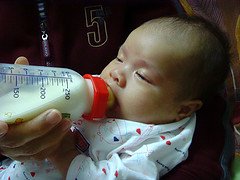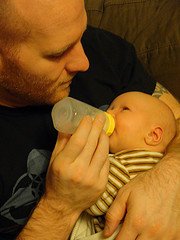Formula Feeding Baby/Bottle Feeding Baby
In the U.S., baby formula is like no other food. It has its own law: The Infant Formula Act of 1980. This Act defines the minimum nutrient requirements, recall procedures, and inspection requirements of all infant formula that is manufactured in the United States. So I recommend that if you are worried about the amounts of nutrients your little one is getting from store-bought formula, to talk with your baby's pediatrician. After that, the only thing you can do as a responsible parent is to make sure you are preparing your little one's formula the safest way. You can do that by doing the following:
Always check the "Use By" date. This is the date that the formula should not be fed to babies. The Federal Drug Administration (FDA) requires this date to be on EACH container of baby formula. It is a manufacturer's guarantee that the nutrients and the general quality of the formula is at acceptable standards up to the "Use By" date.

Never use dented cans. Dented cans can result in spoilage of the food that is inside. And spoiled food can carry harmful toxins, like botulism, which is a form of food poisoning. This is a rare occurrence, but I don't want to gamble using my little one. So if you have a dented can of baby formula, return it to the store for a new one.
Keep unopened liquid and powdered formula in a cool and dry indoor place. Never store your little one's unopened formula in the garage because extreme temperatures can decrease the quality. Extreme temperature changes can also degrade the ingredients and nutrients in the formula. So only store unopened cans of formula at room temperature. Do not put powdered formula in the refrigerator.
Do not freeze baby formula. It may cause a separation of the ingredients.
Wash the top of the formula can before opening it. You never know what dirt or germs are lurking on the top.
Always sterilize bottles and nipples before using them the first time. After that, you can clean them in the dishwasher or wash them by hand with hot soapy water. I also recommend using a bottle brush. It gets in the nooks and crannies of a bottle better than a sponge.
After washing bottles and nipples, dry them with a paper towel. Avoid dish towels because they can be a bacteria haven.
Always prepare formula EXACTLY as instructed on the label. Under-diluted formula can cause dehydration. And over-diluted formula does not give your little one enough nutrition, which can slow down his/her growth. Use only the scoop that comes with the brand you use. Different brands have different size scoops.
It is not necessary to warm formula. It all depends on your baby's personal preference. My little ones used to love a cool bottle of formula on a hot summer day. The main thing to remember is not to serve formula that is too hot. You can test the temperature of the formula by putting a few drops on the inside of your wrist. It should feel slightly warm.

Toss Leftovers. Bacteria from baby’s mouth can seep into the bottle and contaminate the formula and your baby can get sick if he/she drinks it later. So toss out any leftovers.
Don't heat up infant formula ahead of time. Room temperature is the perfect climate for breeding germs. Therefore it is best to prepare one bottle at a time and then give it to your little one immediately. You can also prepare baby formula and then immediately refrigerate it. However, you will have to use it within 24 hours.
You can warm up prepared formula in a container of water. This usually should not take more than 2-3 minutes. Just put some hot (not boiling) water in a bowl or pan. Then put the bottle of prepared formula in the bowl or pan for about 2 or 3 minutes.
Shake the bottle to evenly distribute the temperature and then test a small amount on your wrist. Serve immediately. You can also put the prepared bottle under warm running water for a few minutes, but I think this waste water. So I use to warm bottles using a pan or bowl.
If you are in a hurry, NEVER heat formula in a microwave. The formula can heat unevenly, and if you don't mix it thoroughly after microwaving, it can burn your little one's mouth. OUCH! Some mommies do it, but I didn't. I did not like the thought of microwave radiation in my kids' food at such a young age.
To keep from exposing your baby to bisphenol A (BPA), a chemical whose safety is currently under debate, you can use glass bottles or BPA-free plastics. For example, you can use plastic bottles made of polyethylene (which may be marked with recycling codes 1 or 2).
Finally, always wash your hands before preparing your little one's formula. This cuts down on possible food contamination.
Breastfeeding Baby What If I Can't Breastfeed? Formula Feeding / Bottle Feeding High Chair Safety Organic Baby Food Baby Food Preparation and Storage Baby Food Allergies Baby Safety Resources - Home Page




